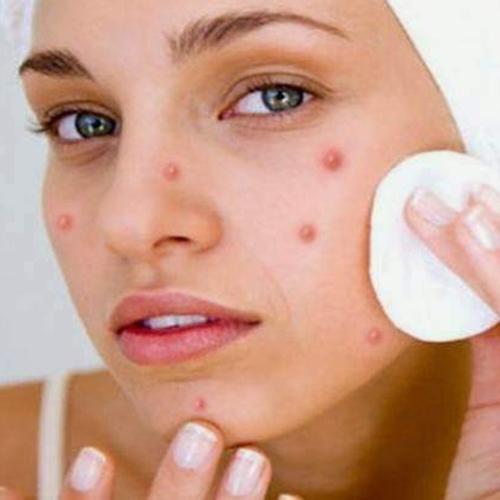Here's Exactly What Salicylic Acid Does to Your Skin
In the over-the-counter battle against breakouts, there are a few key players you should know about, and Salicylic Acid is at the top of that list. Simply speaking, Salicylic Acid is one of acne's biggest enemies. You reach for a product within the second you see a zit invading your face. But, what exactly does salicylic acid do, and what are the best ways to reap its benefits?
First off, let's establish what Salicylic Acid is. It's a little complicated, but the exact structure of Salicylic Acid is important in explaining why (and how) it works so well. When it comes to skin-care products, there are two classes of acids you'll see often: beta hydroxy acids (BHAs) and alpha hydroxy acids(AHAs).
Salicylic Acid is a beta hydroxy acid, this means the hydroxy part of the molecule is separated from the acid part by two carbon atoms, as opposed to an alpha hydroxy acid where they're separated by one carbon atom.
Are you still with us? Good, because this is where it gets fun. This structure is important because it makes Salicylic Acid more oil-soluble so it can penetrate into the pores of the skin
Both alpha and beta hydroxy acids exfoliate the skin, but AHAs are water-soluble, while BHAs are oil-soluble. Examples of AHAs, for reference, include glycolic and lactic acids.
Generally, oil-soluble ingredients penetrate through the lipid layers between the skin cells more readily. In other words, oil-soluble ingredients can penetrate the skin at a deeper level than their water-soluble counterparts.
AHAs work well on the skin's surface to loosen old, dead skin and reveal fresh newer skin, Salicylic acid works deeper [and is] able to penetrate into the pores to unclog them.
What does Salicylic Acid do for the skin?
What all of this means is that Salicylic Acid can get deep into your skin to do its job. This quality is precisely what makes salicylic acid such a potent ingredient for targeting acne — especially for blackheads and whiteheads.
Once it penetrates the skin, Salicylic Acid "dissolves skin debris that clogs pores, [acts] as an anti-inflammatory and also helps red inflamed pimples and pustules go away faster
The ingredient can penetrate so deeply into skin that actually breaks down the connections between skin cells. Once it has penetrated the skin, the acid part of the molecule can dissolve some of the intracellular 'glue' that holds skin cells together
This breaking down of skin cells also promotes exfoliation. Salicylic Acid is considered a keratolytic medication, which means that it's perfect for supreme exfoliation.
Salicylic Acid also loosens and breaks apart desmosomes (attachments between cells in the outer layer of skin). "This 'desmolytic' action encourages exfoliation of skin and unclogging of pores.
One thought etimology of acne is that the skin cells do not behave normally, and rather than sloughing off through a healthy skin cell cycle, they stick together and clog the pores, creating cysts and blackheads. Salicylic Acid aids in removing and loosening these skin cells and helps to dissolve the blackheads.
Salicylic Acid works best on blackheads and whiteheads
There are three factors that contribute to acne: an abnormal sloughing off of skin cells, excessive oiliness, and the action of P. acnes bacteria. Salicylic Acid helps with the first cause by dissolving the type of skin debris that clogs pores and causes acne.
Therefore, the best acne to treat with Salicylic Acid are blackheads and whiteheads. Salicylic Acid can directly dissolve the keratin plugs and regulate the skin cells. It does have some effectiveness against cystic acne due to its antibacterial activity, but less so than the classic blackheads and whiteheads.
You can actually use too much Salicylic Acid, which can become a problem. The primary negative side effect of Salicylic Acid is its ability to irritate and dry skin in those that are very sensitive or those who overuse it.
Depending on the concentration and the number of applications, some people may experience dryness, peeling, redness, and some skin irritation. For this reason, those with skin that's already severely dry or sensitive should consider avoiding SA altogether. It's also not the best choice if you are pregnant or taking certain medications, including blood thinners.
What's more serious: Applying Salicylic Acid or any salicylate to very large portions of your body can lead to salicylate poisoning.So just don't apply a layer of it all over — stick to only acne-prone areas.
Bonus: Salicylic Acid can help with dandruff
Salicylic Acid isn't just for blackheads, according to experts. At lower levels, salicylic acid can speed up the desquamation process and aid in conditions such as dandruff and seborrheic dermatitis, which are caused by a slowing down of skin cells sloughing off













